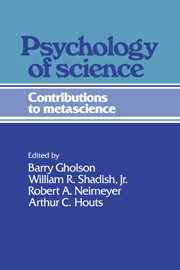Book contents
- Frontmatter
- Contents
- Preface
- Contributors
- 1 The psychology of science: An introduction
- Part I Historical issues in the psychology of science
- Part II The case for a psychology of science
- Part III Creativity and the psychology of science
- Part IV Cognition in the psychology of science
- Part V Social factors in the psychology of science
- Part VI Epilogue and Prologue
- Author index
- Subject index
Part II - The case for a psychology of science
Justifications for a psychology of science
Published online by Cambridge University Press: 05 June 2012
- Frontmatter
- Contents
- Preface
- Contributors
- 1 The psychology of science: An introduction
- Part I Historical issues in the psychology of science
- Part II The case for a psychology of science
- Part III Creativity and the psychology of science
- Part IV Cognition in the psychology of science
- Part V Social factors in the psychology of science
- Part VI Epilogue and Prologue
- Author index
- Subject index
Summary
In Part I, we saw that psychology has been implicitly and sometimes explicitly present in metascience for many years. In a weak sense, this very presence provides a justification for psychology of science. That is, if other metascientists seem functionally unable to do without psychology in their work, it is better that we explicitly develop a psychology of science than let it continue to develop implicitly, haphazardly, and unsystematically.
The present section contains three chapters that follow this thread and more explicitly address some justifications for a psychology of science. Such justifications cannot be taken for granted. Some past scholars have suggested that psychology has little in the way of a constructive contribution to make to our understanding of scientific progress, that its role should be limited to explaining only the irrational aspects of science, or that psychological contributions are redundant to those already made by other disciplines. The authors of chapters in this second section consider a selection of these issues, partly responding to criticisms of psychology of science, partly making a positive case for the role of psychological contributions, and partly assessing honestly some limitations that psychology of science must acknowledge. One approach to the justification of psychology of science is to examine and discuss the merits of past criticisms that such a specialty is not justified.
- Type
- Chapter
- Information
- Psychology of ScienceContributions to Metascience, pp. 89 - 91Publisher: Cambridge University PressPrint publication year: 1989



